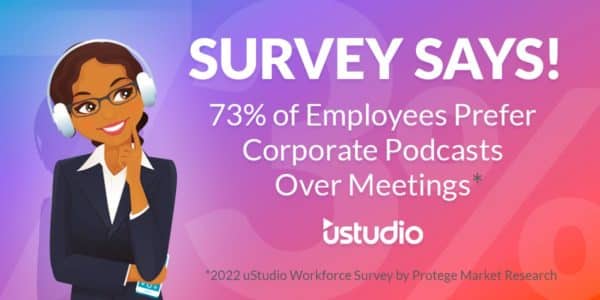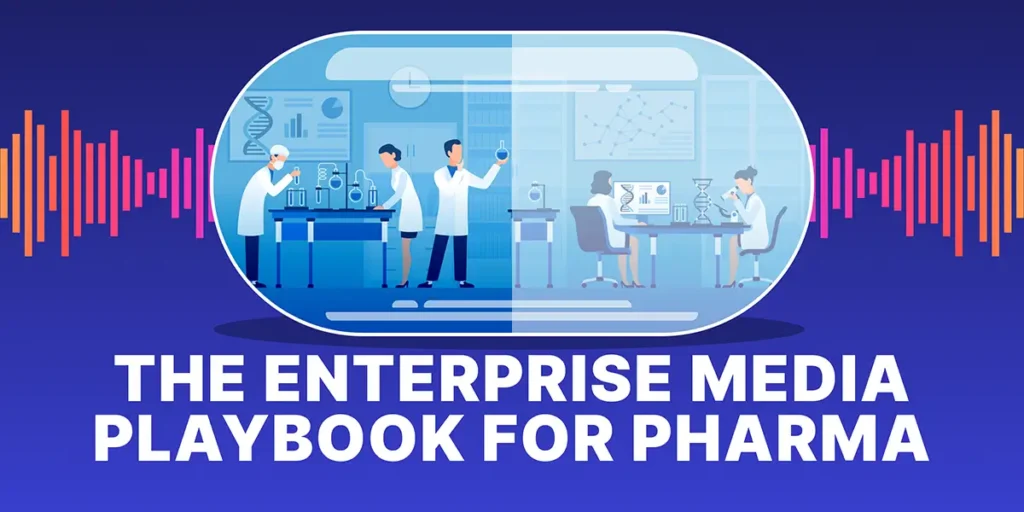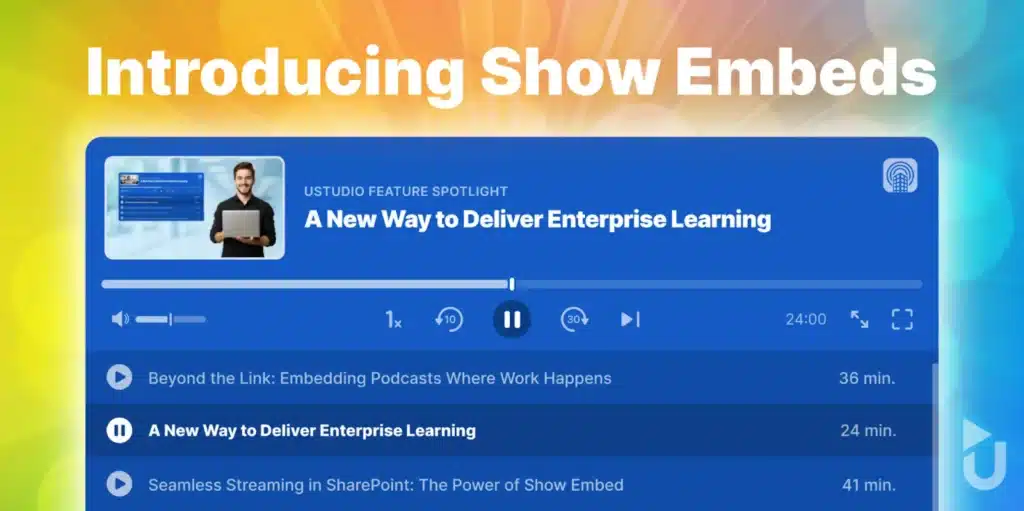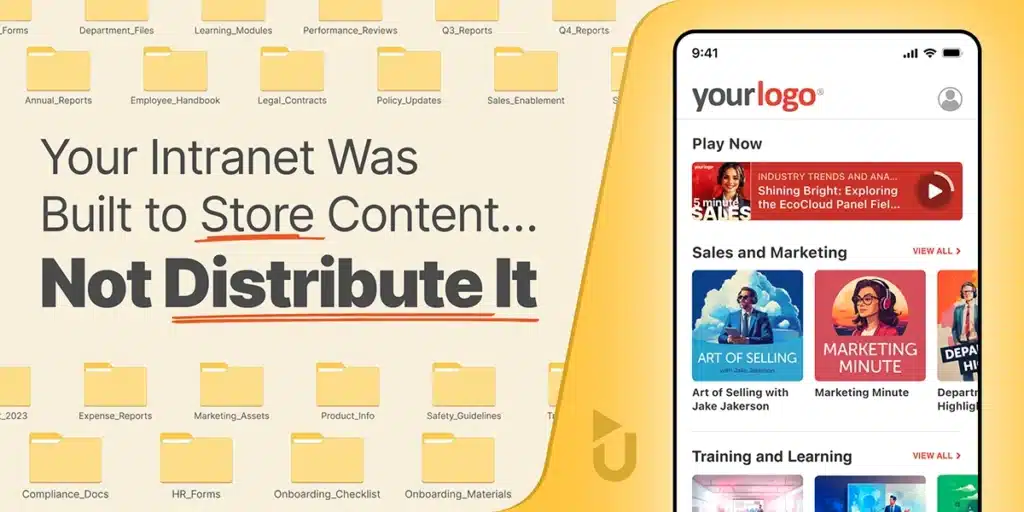Corporate Podcast Benefits: What the Survey Reveals
Jackie Logan | Blog, Podcasting

What Corporate Podcast Benefits Are You Missing Out On?
In the scorching summer heat, it's fair to say almost no one looks forward to doing their yard work. And yet, nearly a third of employees claimed they would rather mow their lawn than read an email from their employer. That’s right – even a simple internal email can be more despised than outdoor manual labor. Read on to discover the many corporate podcast benefits that address the growing distaste for company emails.
New Survey Uncovers Growing Preference for Audio in Workplace Communications
A new survey by Protege Market Research and uStudio polled more than a thousand employees at large enterprises across the United States to better understand communication and learning preferences in the workplace. The results highlight a consistent trend: companies that are still dependent on traditional channels such as email and slide presentations are failing to engage a large percentage of their workers.
Before we discuss corporate podcast benefits, let’s highlight the survey’s key findings that explain why corporate podcasts are so beneficial.
Finding #1: Emails Are Common, but Not Popular
Emails ranked particularly poorly in the survey, despite being one of the most common forms of business communication. For example, 47% of respondents were apathetic or actively disliked reading emails and company newsletters to stay up to date with their company’s news. On top of disliking emails, an even higher number of employees don’t actively engage with company content delivered over email. Nearly 60% of respondents admitted they only skim emails from their employer, compared to the nearly 35% who claimed they read company emails carefully.
Engagement is huge. Even if your email stats show your email was successfully delivered and even opened, how much of the content was read? How carefully was it read? Was it even read at all?
The truth is that many employees simply ignore emails. A quarter of survey respondents reported "often" skipping over emails from employers. Older millennials, those between the ages of 33 and 44, were the worst offenders of email skipping. Nearly a third (32%) of employees in this age group reported often skipping over emails from employers, the highest out of all age groups surveyed.
These findings are in line with what Forbes reported last year—saying up to 71% of employees don’t read company emails at all. The number one reason is that they are inundated with emails and have to weed them out somehow because there simply isn’t enough time or brain power to get through them all.
But don’t ditch the inbox just yet – employees still enjoy emails for certain kinds of communication. An overwhelming 71% of respondents ranked email as their top preferred channel for receiving non-urgent and routine employer information.
However, email was the least preferred when it came to receiving onboarding or training information; a mere 4% of respondents ranked email as their top choice. For training and onboarding information, messaging apps (48%) and conference calls (26%) were the top two choices among employees. These channels allow for a higher level of personalization, ideal for education and engagement.
Finding #2: Employees Would Rather Do Chores Than Sit in a Meeting
While employees preferred meetings for training, this preference didn’t carry over to other types of information sharing. In fact, only 14% of respondents ranked virtual meetings/conference calls as their first or second choice for receiving routine company information.
Additionally, nearly 60% of respondents claimed they would rather do laundry than sit in a company-wide meeting or call, demonstrating the lack of value synchronous calls provide.
The apathy towards meetings also includes one-on-one calls. When asked whether they would rather meet with their manager or watch a video of what their manager had to say on their own time, 55% of employees chose the latter, declining an opportunity for face time with their boss. Ultimately, calls are time-consuming and require employees to be present at a very specific moment, despite personal conflicts or workload. They also require all parties to stop their work to attend, a productivity killer.
Corporate Podcast Benefits Over Email
If you are considering adding corporate podcasting to your internal communications and sales enablement strategies, you may have to get some buy-in. While creating a streaming network for your podcasts is relatively easy with the right podcast production partner, it requires planning and leadership support. Here are corporate podcast benefits you can share with your team to get them on board.
Discover the Power of Corporate Podcasts
Watch this quick video to learn how private podcasting can transform your company’s communication and employee engagement strategies.
Corporate podcasts are more engaging
There are many corporate podcast benefits, but perhaps the top advantage is that podcasting is so much more engaging. Unlike an email, podcasts involve interviews, conversations, training and other audible (and sometimes visual if live streaming) communications that pull in the listener and allow them to feel part of the dialog.
Emails may be traditional, but that doesn’t mean they are the only communication channel. In this podcast-obsessed culture, it only makes sense to offer information in a podcast format. Again, engagement is priority number one, so as long as you create engaging content for your streaming program, you’re already lightyears ahead of an email.
Corporate podcasts offer greater flexibility
To effectively communicate with employees, companies must meet their employees where they are with the flexibility they need. When survey respondents were asked to rank and list corporate podcast benefits, flexibility was the top benefit reported, with 34% of respondents agreeing this was the biggest advantage. Media streaming, such as podcasting, supplies the flexibility for employees to consume information on the go, unlike traditional read/write formats.
Corporate podcasts lower costs and foster greater productivity
An often overlooked corporate podcast benefit is productivity costs. It’s important to consider the time and money associated with meetings. As we said, meetings (virtual, calls or in-person) take time away from tasks. CBS News discussed a report that found that companies waste nearly $100 million annually on meetings. “A common refrain among workers who were polled as part of the report was that they are pulled into too many time-wasted gatherings. That often leads to boredom and frustration, with employees saying the squandered time interfered with their completing more productive work.”
Podcasting, on the other hand, enables listeners to listen when they have extra time, downtime, and in-between time, such as when they are traveling, waiting at the DMV…you get the picture. Listening to streaming content on demand is a significant corporate podcast benefit.
Corporate podcasts are more absorbable
The ability to re-listen or rewind was the next highest reported corporate podcast benefit, which explains why 73% of respondents would rather listen to a podcast than sit in an hour-long company meeting. Employees value being able to revisit parts they might have missed or reference the information at any time, unlike a typical staff call.
This capability ties back into engagement and is particularly beneficial when used for training and learning purposes. The ability to re-listen to ensure understanding ensures employees can be more proactive in their training and not miss critical information that may require another listen. In fact, they can listen as many times as they need to fully comprehend what is being taught.
Corporate podcasts are easy to produce
We can't talk about corporate podcast benefits without noting how easy they are to produce. You don’t need a ton of expensive equipment or a fancy recording studio. Check out this “Beginner’s Guide to Podcasting Gear” to see just how simple a streaming network can be to set up.
Then, take a look at “How to Create a Private Podcast: A Step-by-Step Guide for Enterprises” to learn the seven steps for launching your private podcast. By investing in basic podcasting equipment and following a few easy steps, you’ll have a platform that employees trust and prefer over emails or most any other channel.
Take Advantage of the Many Corporate Podcast Benefits
Rather than making your employees wish they were out mowing the lawn, swap out long, often costly staff meetings for streamlined podcast episodes that can be listened to on the go. Instead of filling emails with training information that will most likely be skimmed, create episodic, engaging videos employees can revisit and rewind at their own pace when and where they have the time to truly engage.
Incorporating media streaming gives your employees the information they want in the format that works best for them, strengthening engagement and retention of employees. It also lowers corporate costs and keeps everyone on task and in the know for a more productive, happy workforce.
If your business is ready to take this step to better communicate with its employees, contact uStudio today to schedule a demo.
Methodology
In July 2022, Protege Market Research conducted a survey of 1,043 workers from companies with more than 1,000 employees to better understand sentiment surrounding workforce communications and preferences. All respondents were based in the U.S. and represent a sample that’s closely representative of U.S. census data in terms of age and gender identity.
I am an experienced Go-to-Market and product development leader of SaaS solutions across several industries, both commercial and government. I blend creativity, strategy, and research to launch and evolve products with a knack for asking the right question at the right time to expose unspoken market needs. I leverage my crisp communication skills to organize cross functional teams, manage high-profile client success, and publish public-facing product marketing material.


